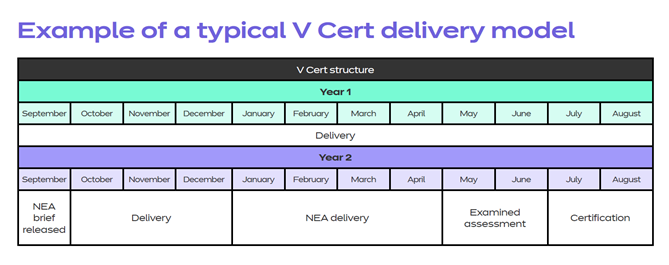Following the exciting news that our new suite of V Cert Technical Awards will be ready for first teach in September 2022, I wanted to summarise the key things that you’ll need to know about them – including the main similarities and differences between V Certs and GCSEs.
I also want to assure you that although switching your provision can feel like an additional admin burden, we can help you every step of the way to ensure a seamless switch to NCFE qualifications. As experts in vocational education, you can trust us to give you the highest level of support and guidance to make V Certs a success at your school.
So, let me tell you a little more about our V Certs!
1. A technical equivalent to GCSEs
A good starting point would be to answer the question: “what are V Certs?”
Designed in collaboration with employers and practitioners, our V Cert Technical Awards are vocational equivalents to GCSEs that empower your pupils with industry-relevant skills and knowledge, giving them a taste of what it’s like to complete real-world tasks and projects.
As Technical Awards, our V Certs complement and supplement the academic curriculum, providing applied knowledge not usually acquired through general qualifications (such as GCSEs). They fulfil entry requirements for academic, technical and applied study post-16 alongside GCSEs, counting towards the Open Group of your Progress 8 measures.
All our V Certs are combined Level 1 / Level 2, to recognise the achievements of pupils of all abilities. They’re graded from Level 1 Pass, Merit, Distinction, through to Level 2 Pass, Merit, Distinction, Distinction*, which is the equivalent to GCSE grades 1-8.5.
2. Mirroring the GCSE structure
To fit more easily within the rest of your curriculum, our new and improved V Certs better mirror the structure of GCSEs.
The external examination element of the V Cert now happens at the end of the qualification, as the Department for Education (DfE) has introduced the “terminal assessment rule” for all Technical Awards. This means the exam (EA) can only be taken once the synoptic project (now known as the non-exam assessment or NEA) is complete.
By structuring our V Certs in a similar way to GCSEs, this also makes them feel more familiar to teachers who haven’t delivered vocational qualifications before. Read more about the structure and qualification content of our V Certs.

3. A simple assessment format
Our V Certs are designed with just two assessments – both of which take place in the certificating year. This will help you to maximise teaching time, as you will never need to juggle assessments between different cohorts at the same time.
Assessing pupils using project-based non-exam assessments (the synoptic project / NEA), as well as external examinations, gives them the opportunity to achieve based on their skills as well as their knowledge.
In all but two* of our V Certs, the NEA counts for 60% of the overall qualification grade – putting more emphasis on pupils’ ability to demonstrate what they have learnt and relieving some exam pressure.
*NEA carries 50% weighting for Child Development and Care and Health and Social Care.
4. Wide range of sector subject areas (SSAs)
From Engineering, to Business and Enterprise, to Health and Social Care – our V Cert qualifications cater to a wide range of sector areas, preparing pupils with the knowledge, skills and behaviours they’ll need to advance onto further study or an apprenticeship in their chosen area.
We’ve also refreshed course content to reflect the latest employer needs and requirements, and have introduced three brand-new qualifications in Creative Design and Production, Food and Cookery, and Sports Studies.
By offering V Certs alongside GCSEs, you’ll be developing a broad and balanced Key Stage 4 curriculum that is rich and engaging and, crucially, that meets the needs of every pupil – no matter their intended career, their passions, or the goals they wish to achieve on their lifelong learning journey.
5. We’re vocational experts
At NCFE, we're technical and vocational specialists who care about helping you to get it right – so we support you every step of the way throughout your delivery of our V Cert qualifications. Our range of helpful tools include:
- Free classroom packs containing ready-to-go teaching and learning materials
- “Prep to teach” events led by our Provider Development team
- Regular subject-specific teacher continuing professional development (CPD) sessions.
These tools and resources will help you to spend less time on lesson planning and instead, hit the ground running with your teaching. They’ll also ensure that you’re up to speed with the qualification content and delivery techniques for harder to teach areas – all of which will help you to help your learners succeed.
Our V Certs are designed to fit seamlessly into your KS4 curriculum. To find out more, visit our V Certs homepage, or speak to a member of our team by calling 0191 239 8000 or emailing [email protected].







